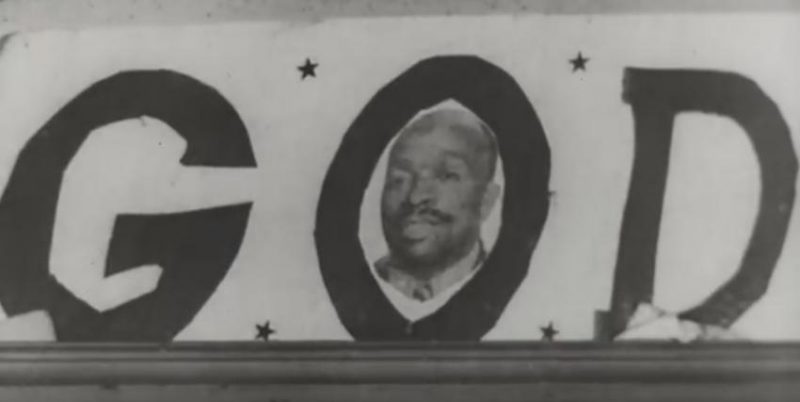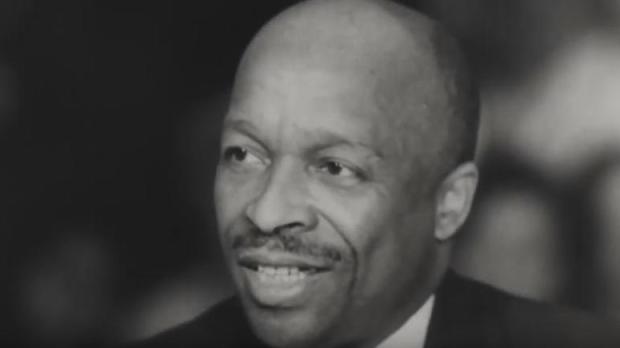Lenten Campaign 2025
This content is free of charge, as are all our articles.
Support us with a donation that is tax-deductible and enable us to continue to reach millions of readers.
He was the most beguiling oracle ever to grace our land: a short, plump, bald [African American] who always smiled and spouted a gospel so incomprehensible that it attracted a vast and enthusiastic clientele, black and white and lustrous hues in between. His adoring fold called him Father Divine. It is the essence of his genius that he refused to recognize, much less discuss, questions about his divinity. “I don’t have to say I’m God,” he once declared, “and I don’t have to say I’m not God. I have said there are millions of people who call me God…I produce and shake the earth.” – Leo Rosten
My first introduction to Father Divine came in my youth, when I found an essay about him in Leo Rosten’s sadly out-of-print, still very much worth owning book of essays, People I Have Loved, Known or Admired.
The truth is, in his Depression-era heydey, Father Divine actually was called “God” by millions (yes, millions) of people, and he had various “Heavens” in American cities where people of all races lived together in harmony, (segregated by sex but not by color) enjoyed festive meals and happily declared a message of peace, social justice and joy to anyone who would listen.
Rosten’s essay is a very enjoyable read, and mostly accurate, but he leans so heavily toward his own amusement that he misses some important truths about this enormously fascinating character. Born (it is believed) George Baker, the son of emancipated slaves, this former gardener eventually started preaching, first in a Baptist church and then on his own, establishing a multi-racial following and the International Peace Movement. His message, often repetitious, was relentlessly positive in tone (songwriter Johnny Mercy said his hit “Accent-uate the Positive” was inspired by Father Divine’s public remarks).

He wore $500 suits and permitted his followers to give him luxury cars, but Divine also — in a peaceful and upbeat manner that seems almost an anticipatory amalgam of Martin Luther King, Jr and Norman Vincent Peale — established businesses that employed his followers and offered affordable housing to many, fought against Jim Crow laws, won voting rights for his followers when they were being given a hard time, and he seemingly did it all without losing his smile. Had he not firmly established himself as a religious-cult figure (a move which, let’s face it, destroys one’s credibility with the mainstream), who knows what lasting strides this incredibly charismatic man might actually have made for the cause of social justice?
Thanks to film producer Lenny Feinberg, we have a chance to observe a little of that charisma through his documentary, Father’s Kingdom, a 90-minute look at Father Divine and his followers, the last of whom, now elderly but very spry, still live at 73-acre Gladwyne estate in Pennsylvania — the “Heaven” that was the last residence of Father Divine before his death. These remnants have created a memorial museum to the founder of their movement.
Father’s Kingdom came about after Feinberg’s daughter, Julia, attended a banquet at Gladwyne and related to him how the women and men there began the meal by first serving the empty place reserved for Father Divine, even addressing him as though he were present.
Eventually the movement opened its house to the filmmaker, for nearly three years, in hopes of keeping Divine’s message and memory alive, and the resulting documentary is at once skeptical and respectful, troubled, and affectionate. Feinberg is not putting these people on display for anyone’s mockery or amusement. His film is the study of a man who preached peace to people who wanted that message more than any other, and of the people who still proclaim it and live quiet, celibate lives of duty, directed toward the god in whom they have believed. In the process Feinberg manages to cast reasonable doubt on some of the ways and means of the movement while also helping the viewer understand how and why Father Divine won the love and loyalty of these people.
There is a masterful and welcome balance to the film, which — quite refreshingly — resists the temptation to tell the viewer what to think. Rather we meet Father Divine head on; we see the headlines and hear the often racist media narratives; we listen to aging believers who are stalwart and dignified; we see the woman who, as a child, was abandoned — unparented — within the movement and still feels that deep wound; we watch a man who openly shows us his struggle between a growing attraction to the movement and the longtime romantic relationship he would have to put aside in order to embrace it.
The strange story of Father Divine — a self-proclaimed god whose triune person seems to have been one part showman, one part charlatan, one part philanthropic entrepreneur — is actually a glimpse into an eternal mystery: the mystery of faith, and the human hunger for the transcendent. It is no new thing for human beings to seek out the pearl of great price, and to abandon everything else once they believe they have found it.
It is, in fact, the second oldest story in the world, the one that came right after Eden.
If you get an opportunity to see Father’s Kingdom, I hope you will take it. It is fascinating, and entertaining, and like the god it has taken for its subject, it is breathtakingly human.

